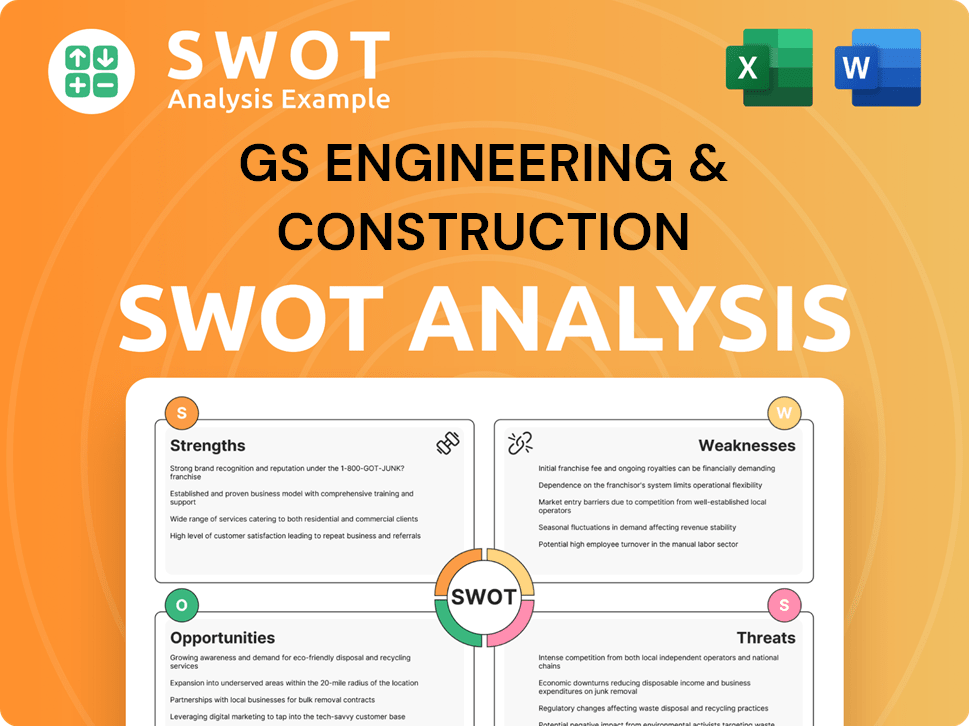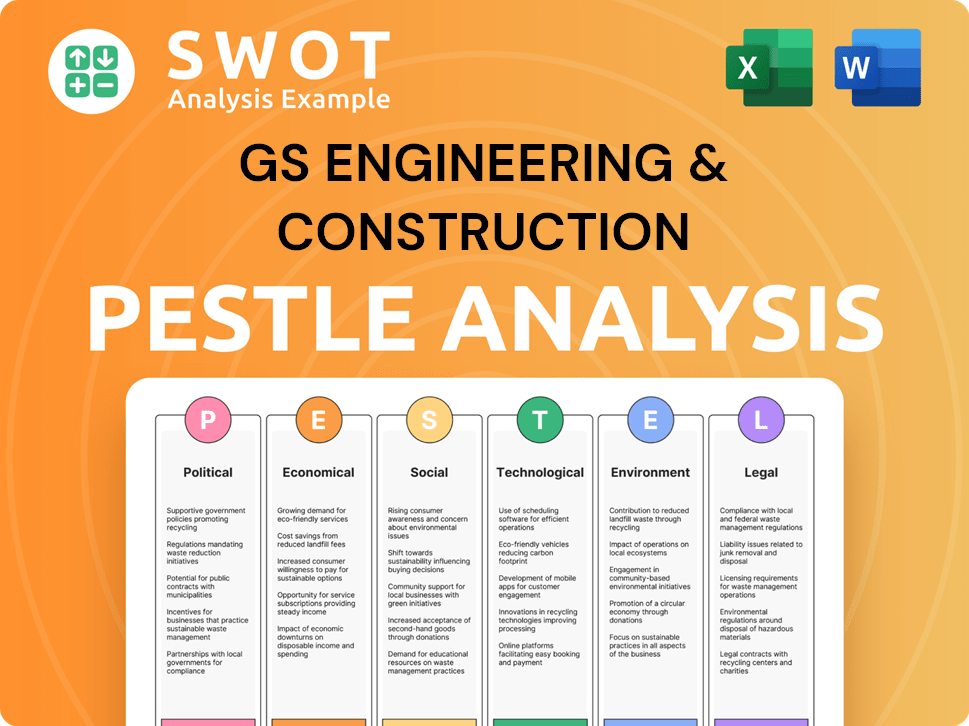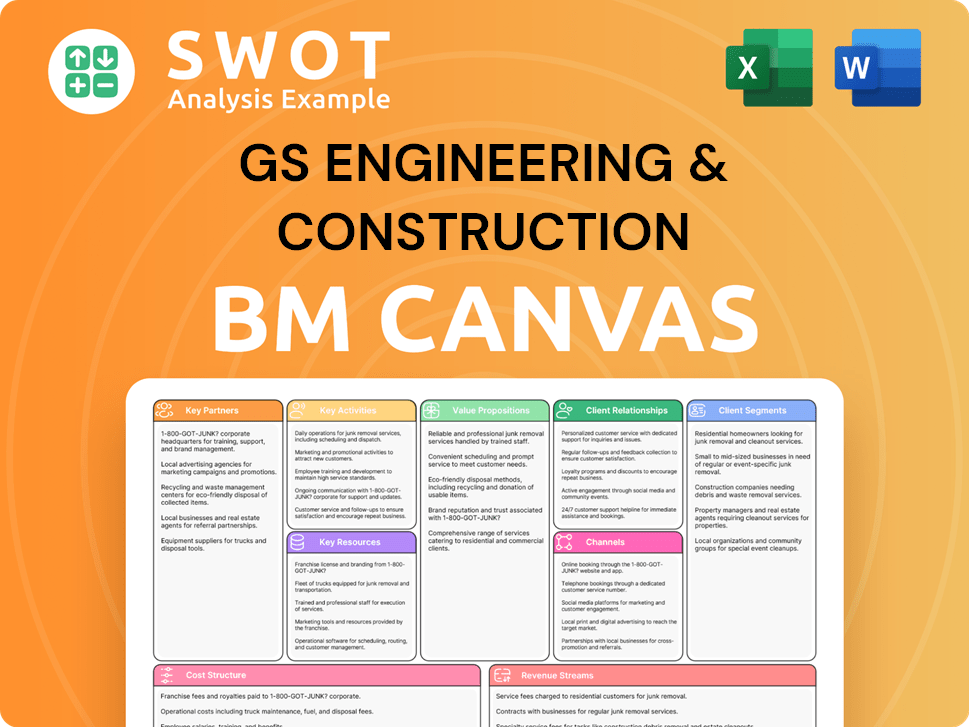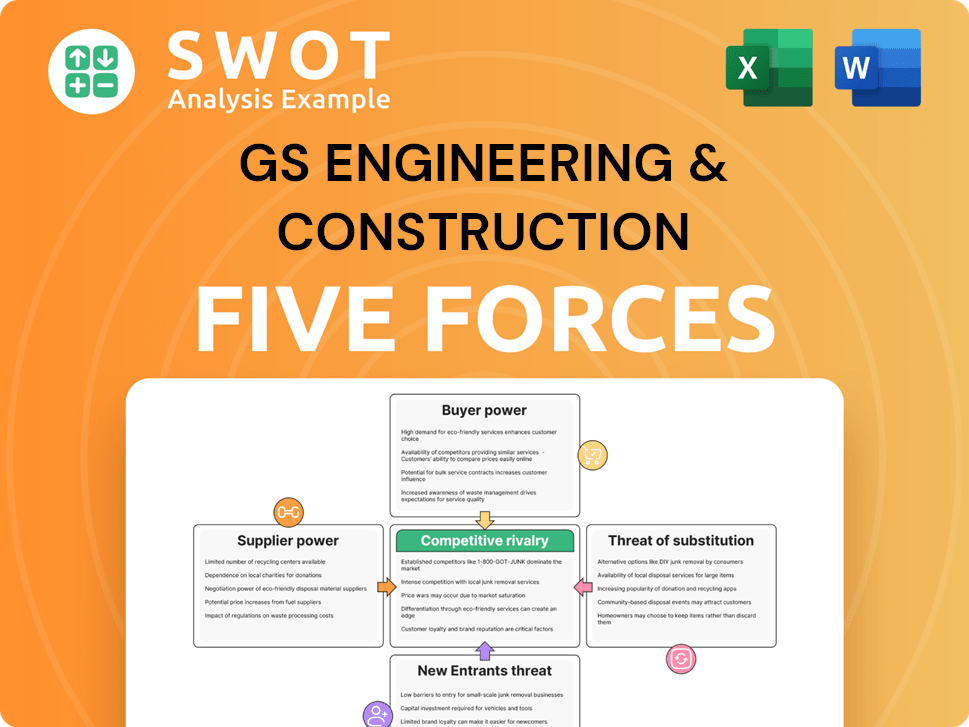GS Engineering & Construction Bundle
What Shaped the Global Construction Landscape: The GS E&C Story?
From its humble beginnings in South Korea to its current global presence, GS Engineering & Construction (GS E&C) has built a remarkable legacy. Founded as the construction arm of the Lucky-Goldstar Group, now LG Group, in 1969, the company played a pivotal role in South Korea's industrialization and urban development. Today, GS E&C stands as a testament to innovation and resilience in the GS Engineering & Construction SWOT Analysis.

This exploration delves into the GS E&C history, tracing its evolution from a Korean construction firm to a global leader. We'll uncover the key projects, financial milestones, and strategic decisions that have defined this GS construction company, providing insights into its impact on the construction industry and South Korea's economy. Understanding the history of GS Group is key to understanding GS E&C's journey.
What is the GS Engineering & Construction Founding Story?
The GS E&C history begins in 1969 with the establishment of Lackhee Development Co. in Seoul, South Korea. This marked the construction division of the Lucky-Goldstar Group, later known as LG Group. It was founded to capitalize on the post-war reconstruction and industrialization of South Korea.
The initial business model focused on general construction. The company's vision evolved, leading to several strategic changes. The company's early trajectory was significantly influenced by South Korea's rapid economic growth and emphasis on industrial development.
In 1975, the company was rebranded as Lucky Development Co. Further expansion occurred with the establishment of Lucky International Construction Co. in 1977. A strategic merger with Lucky Overseas Construction Corp. in 1979 enhanced its capabilities, and the company went public with its Initial Public Offering in 1981.
GS E&C's early years were marked by significant strategic moves and expansion in the Korean construction industry.
- 1969: Founding of Lackhee Development Co.
- 1975: Rebranding to Lucky Development Co.
- 1977: Establishment of Lucky International Construction Co.
- 1979: Merger with Lucky Overseas Construction Corp.
- 1981: Initial Public Offering.
GS Engineering & Construction SWOT Analysis
- Complete SWOT Breakdown
- Fully Customizable
- Editable in Excel & Word
- Professional Formatting
- Investor-Ready Format

What Drove the Early Growth of GS Engineering & Construction?
The early years of GS Engineering & Construction (GS E&C), formerly known as Lucky Development Co. and Lucky International Construction Co., were marked by significant growth and expansion. This period laid the groundwork for its future as a major player in the global construction industry. The company's strategic moves during this time were crucial in shaping its trajectory. Mission, Vision & Core Values of GS Engineering & Construction played a key role in this transformation.
During the 1970s, GS E&C, under its initial names, began its journey towards international presence. This decade was critical for the GS construction company, as it started to establish its operations beyond South Korea. This early global expansion set the stage for more significant achievements in the following decades.
The 1980s were transformative for GS E&C. The company went public with its Initial Public Offering in 1981. GS E&C expanded its reach by establishing subsidiaries in the U.S. and the Middle East. The completion of major projects, such as the Lucky Goldstar Twin Tower in 1987, showcased its growing capabilities. By the end of the decade, GS E&C had become a leading international contractor.
The 1990s saw GS E&C further solidify its global presence. The company earned construction licenses in Japan and expanded into Thailand and China. A major milestone was the merger to form LG Engineering & Construction Corp in 1999. This period also saw the introduction of advanced environmental management systems.
GS E&C focused on innovation, securing patents, and leading in sustainable practices. This strategic expansion and focus on quality and environmental stewardship proved pivotal. The company's growth efforts were shaped by a strong market reception, driven by increasing global demand for infrastructure and industrial facilities. This positioned GS E&C as a leader in global infrastructure and construction.
GS Engineering & Construction PESTLE Analysis
- Covers All 6 PESTLE Categories
- No Research Needed – Save Hours of Work
- Built by Experts, Trusted by Consultants
- Instant Download, Ready to Use
- 100% Editable, Fully Customizable

What are the key Milestones in GS Engineering & Construction history?
The GS Engineering & Construction, or GS E&C, has a rich history marked by significant milestones in the Korean construction industry and beyond.
| Year | Milestone |
|---|---|
| 2005 | Rebranded as GS Engineering & Construction Corp., signaling a new era of growth. |
| 2000s | Launched the 'Xi' apartment brand, establishing a leading position in premium residential development. |
| 2010s | Secured major contracts for solar power plants, wastewater treatment facilities, and bridges, consistently ranking among the world's top construction companies. |
| 2012 | Acquired GS Inima Environment, a global water treatment and purification company. |
| 2020s | Expanded its global footprint through strategic acquisitions, such as Elements Europe and Danwood S.A., leaders in modular housing. |
| 2022 | Partnered with BASF to jointly develop modular solutions for Carbon Capture facilities. |
| 2025 | Signed a Memorandum of Understanding with Honeywell to digitalize the plant industry and expand environmentally friendly energy ventures, and also collaborated with Amogy and HD Hyundai Infracore to deploy an ammonia-powered distributed power generation system in Pohang-si, South Korea. |
GS E&C has consistently embraced innovation throughout its history, particularly in sustainable practices and technological advancements. The company has been at the forefront of green technologies, including the export of the Green Hydrogen Plant Module to the United States and the opening of its R&D Center focused on sustainable development.
GS E&C has been recognized for its commitment to sustainable practices, earning a place on the Dow Jones Sustainability Index for several consecutive years (2009-2020).
The company expanded into modular housing through acquisitions like Elements Europe and Danwood S.A., enhancing construction efficiency and sustainability.
GS E&C has made significant strides in green technologies, including the export of the Green Hydrogen Plant Module and the opening of its R&D Center.
In 2025, GS E&C signed a Memorandum of Understanding with Honeywell to digitalize the plant industry.
GS E&C partnered with BASF to jointly develop modular solutions for Carbon Capture facilities, aiming to remove CO2 from exhaust gases.
GS E&C collaborated with Amogy and HD Hyundai Infracore to deploy an ammonia-powered distributed power generation system in Pohang-si, South Korea.
Despite its achievements, GS E&C has faced various challenges, including financial pressures and geopolitical issues. The company experienced a significant decline in operating profit and sales in the first quarter of 2024, with operating profit down 55.3% and sales down 12.6% year-on-year, partly due to high interest rates and rising raw material prices.
In the first quarter of 2024, GS E&C faced a decline in operating profit and sales, with operating profit down 55.3% and sales down 12.6% year-on-year.
In 4Q24, operating profit missed consensus by 23% due to additional costs related to a Singapore infrastructure project and the green division, as well as bad debt expenses from a housing project.
The company faced scrutiny regarding its involvement in Iran, leading to the cancellation of a gas project in 2010 due to sanctions.
In response to market conditions, GS E&C has undertaken strategic pivots, including exploring stake sales in subsidiaries to enhance financial stability.
High interest rates and rising raw material prices have also impacted the company's financial performance.
The company's resilience is demonstrated by its ability to adapt, as evidenced by a rapid turnaround in operating profit in the first half of 2024, reaching 146 billion won.
GS Engineering & Construction Business Model Canvas
- Complete 9-Block Business Model Canvas
- Effortlessly Communicate Your Business Strategy
- Investor-Ready BMC Format
- 100% Editable and Customizable
- Clear and Structured Layout

What is the Timeline of Key Events for GS Engineering & Construction?
The GS Engineering & Construction, a prominent player in the Korean construction industry, has a rich history marked by strategic shifts and significant achievements. Founded in 1969 as Lackhee Development Co., the construction arm of the Lucky-Goldstar Group, it has evolved through various rebranding and mergers, culminating in its current form. The company's journey includes an Initial Public Offering (IPO) in 1981, the completion of iconic projects like the Lucky Goldstar Twin Tower, and a strategic focus on global expansion and sustainable practices.
| Year | Key Event |
|---|---|
| 1969 | Founded as Lackhee Development Co., the construction arm of Lucky-Goldstar Group in Seoul, South Korea. |
| 1975 | Rebranded as Lucky Development Co. |
| 1977 | Establishment of Lucky International Construction Co. |
| 1979 | Strategic merger with Lucky Overseas Construction Corp. |
| 1981 | Initial Public Offering (IPO). |
| 1987 | Completion of the Lucky Goldstar Twin Tower. |
| 1999 | Merged to form LG Engineering & Construction Corp. |
| 2005 | Corporate name changed to GS Engineering & Construction Corp. and launched the 'Xi' apartment brand. |
| 2010 | Joined the Dow Jones Sustainability Index (DJSI) World. |
| 2012 | Acquired GS Inima Environment, a global water treatment and purification company. |
| 2020s | Expanded global footprint with acquisitions of modular housing leaders Elements Europe and Danwood S.A. |
| 2022 | Partnered with BASF to develop modular solutions for Carbon Capture facilities. |
| October 2023 | Huh Yoon-hong appointed as CEO. |
| 2024 (Q1) | Operating profit was 71 billion won on sales of 3.07 trillion won, down 55.3% and 12.6% respectively from a year earlier. |
| 2024 (H1) | Achieved an operating profit of 146 billion won. |
| 2024 (Q3) | Reported a net profit of 120.8 billion won, up 939.5% year-on-year, with operating income up 35.9% to 81.8 billion won. |
| 2024 (Full Year) | Reported consolidated revenue of 12.864 trillion Korean Won and a net income of 245.568 billion Korean Won. |
| May 2025 | Signed a Memorandum of Understanding with Honeywell to cooperate on digitalizing the plant industry and expanding environmentally friendly energy ventures. |
| April 2025 | Partnered with Amogy and HD Hyundai Infracore and Pohang-si to deploy an ammonia-powered distributed power generation system, with plans for a 1-megawatt (MW) pilot by 2026 and scaling to 40 MW by 2028-2029. |
For 2025, GS E&C anticipates new orders of 14.3 trillion Korean Won and revenue of 12.6 trillion Korean Won. The company expects a 40.1% year-on-year increase in annual consolidated operating profit, reaching 400.9 billion Korean Won. While building/housing revenue is expected to slow, growth in the plant segment and new businesses should offset the decline.
GS E&C is exploring strategic options, including potential stake sales in subsidiaries like GS Inima Environment and GS Elevator, to secure cash for growth and reinvest in sustainable ventures. The potential sale of GS Inima could significantly improve financial health. The company aims to strengthen its business portfolio and enhance its risk management framework.
Industry trends for 2025 suggest continued modernization through technological advancements, including AI-enabled automation and digital tools, and a focus on renewable and clean energy construction projects. The company's future direction, as articulated by CEO Huh Yoon-hong, focuses on 'Perfecting a safer today, forging a brighter tomorrow: with transparent trust and relentless innovation, we create a better future for all,' aiming to transcend traditional construction.
The company's commitment to sustainability is evident through its partnership with Amogy and HD Hyundai Infracore for an ammonia-powered distributed power generation system, with plans for a 1-megawatt (MW) pilot by 2026 and scaling to 40 MW by 2028-2029. The building/housing cost ratio is also anticipated to continue improving as high-cost housing projects wind down.
GS Engineering & Construction Porter's Five Forces Analysis
- Covers All 5 Competitive Forces in Detail
- Structured for Consultants, Students, and Founders
- 100% Editable in Microsoft Word & Excel
- Instant Digital Download – Use Immediately
- Compatible with Mac & PC – Fully Unlocked

Related Blogs
- What is Competitive Landscape of GS Engineering & Construction Company?
- What is Growth Strategy and Future Prospects of GS Engineering & Construction Company?
- How Does GS Engineering & Construction Company Work?
- What is Sales and Marketing Strategy of GS Engineering & Construction Company?
- What is Brief History of GS Engineering & Construction Company?
- Who Owns GS Engineering & Construction Company?
- What is Customer Demographics and Target Market of GS Engineering & Construction Company?
Disclaimer
All information, articles, and product details provided on this website are for general informational and educational purposes only. We do not claim any ownership over, nor do we intend to infringe upon, any trademarks, copyrights, logos, brand names, or other intellectual property mentioned or depicted on this site. Such intellectual property remains the property of its respective owners, and any references here are made solely for identification or informational purposes, without implying any affiliation, endorsement, or partnership.
We make no representations or warranties, express or implied, regarding the accuracy, completeness, or suitability of any content or products presented. Nothing on this website should be construed as legal, tax, investment, financial, medical, or other professional advice. In addition, no part of this site—including articles or product references—constitutes a solicitation, recommendation, endorsement, advertisement, or offer to buy or sell any securities, franchises, or other financial instruments, particularly in jurisdictions where such activity would be unlawful.
All content is of a general nature and may not address the specific circumstances of any individual or entity. It is not a substitute for professional advice or services. Any actions you take based on the information provided here are strictly at your own risk. You accept full responsibility for any decisions or outcomes arising from your use of this website and agree to release us from any liability in connection with your use of, or reliance upon, the content or products found herein.